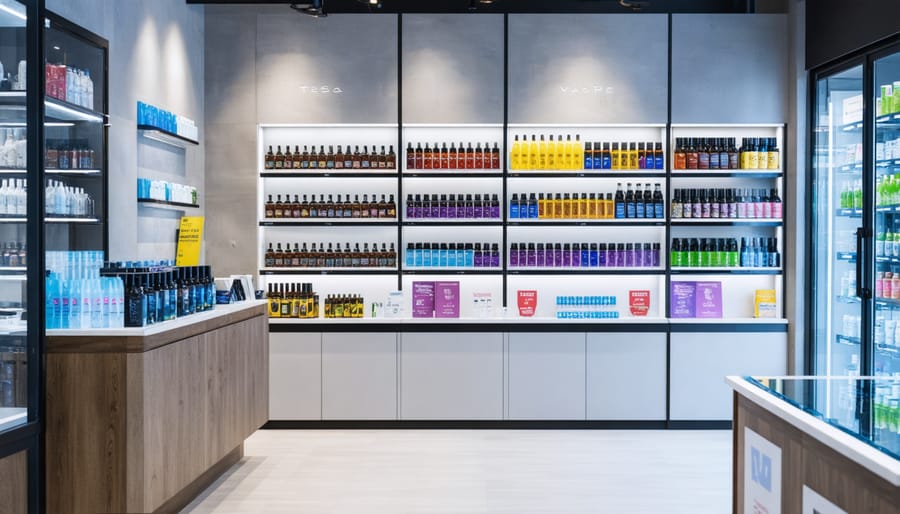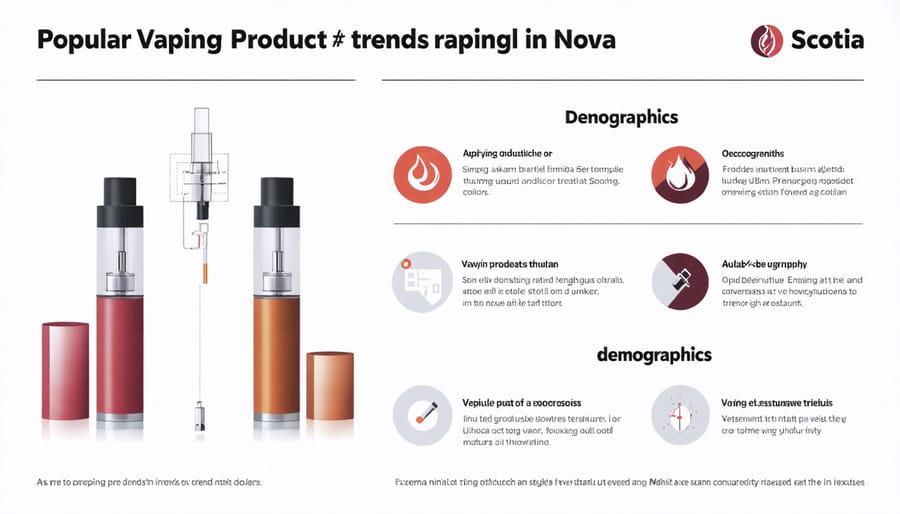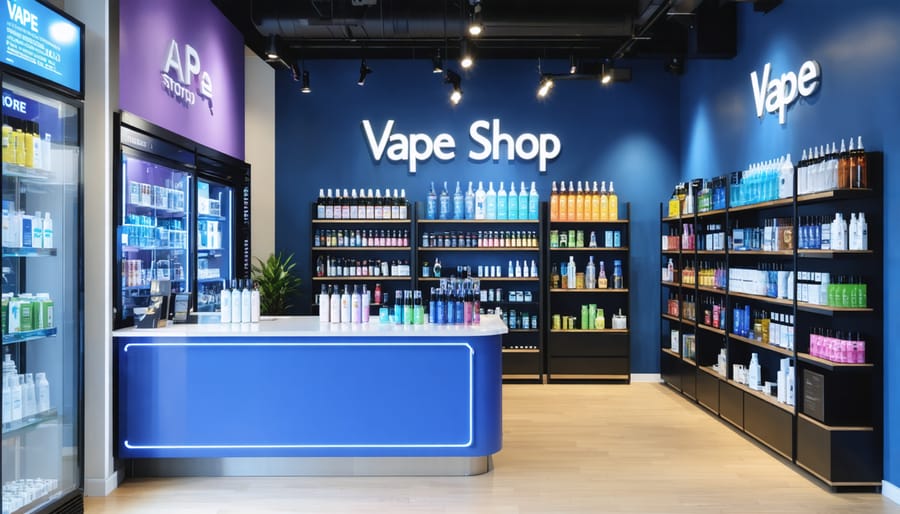Nova Scotia’s vaping landscape has transformed dramatically in 2024, with stricter regulations and evolving consumer preferences reshaping how authorized vape store operators conduct business. Recent data shows a 25% surge in disposable vape sales across the province, while flavored e-liquid restrictions have pushed many retailers to diversify their product offerings. Local health authorities report that approximately 16% of Nova Scotians now use vaping products, marking a significant shift in tobacco alternatives.
The province’s unique regulatory framework, including the ban on flavored vaping products and maximum nicotine concentration limits, has created distinctive market dynamics that set Nova Scotia apart from other Canadian provinces. As municipalities adapt to these changes, both consumers and businesses are navigating a complex landscape of compliance requirements, product innovation, and changing social attitudes toward vaping.
Recent Regulatory Changes Shape Local Vape Market
New Provincial Restrictions
Nova Scotia has implemented stringent new restrictions on vaping products, following extensive regulatory consultations in Nova Scotia. The province now prohibits the sale of flavoured e-cigarettes and vaping products, except for tobacco flavour. Maximum nicotine concentrations are capped at 20mg/ml, with retailers required to maintain detailed sales records.
Store owners must now display prominent health warning signs and cannot showcase vaping products visible from outside their establishments. Additionally, the regulations restrict promotional materials and mandate special licensing for vendors. Online sales face stricter age verification requirements, while retail locations must maintain minimum distances from schools and youth-focused facilities.
These measures aim to address rising youth vaping rates while maintaining access for adult smokers seeking alternatives to traditional cigarettes. Businesses have until July 2024 to fully comply with all new requirements.

Impact on Local Businesses
Local vape shops across Nova Scotia are showing remarkable resilience as they navigate the changing regulatory landscape. Many store owners have invested in updated inventory systems and employee training to ensure compliance with stricter age verification requirements and product restrictions.
Small businesses are adapting their product lines, focusing more on approved flavours and nicotine strengths that meet provincial guidelines. Several shops have expanded their services to include customer education programs and smoking cessation support, helping them maintain customer relationships while promoting responsible vaping practices.
Despite initial concerns about business impacts, most stores report steady customer traffic, though profit margins have tightened. Some retailers have diversified their offerings to include approved accessories and alternative products. Local shop owners are also collaborating through industry associations to share compliance strategies and best practices, demonstrating the community’s commitment to responsible business operations while serving their customers’ needs.
Shifting Consumer Preferences in Nova Scotia

Popular Products and Flavors
In Nova Scotia’s vaping market, fruit-flavored e-liquids continue to dominate local sales, with mango, strawberry, and blue raspberry leading consumer preferences. Recent surveys of South Shore vape shops indicate a growing demand for devices featuring adjustable airflow systems and pod-based configurations, particularly among adult users transitioning from traditional tobacco products.
Local retailers report that disposable vapes have gained significant traction, especially in urban areas like Halifax and Sydney, owing to their convenience and ease of use. However, traditional refillable pod systems remain popular among long-term users who prioritize cost-effectiveness and environmental considerations.
Nicotine salt formulations, typically available in 20mg and 50mg strengths, represent a substantial portion of sales across the province. Local shop owners note an increasing interest in lower-nicotine options and tobacco-flavored varieties, particularly among older customers.
Canadian-made e-liquids have seen a surge in popularity, with Nova Scotian vapers showing strong support for domestic brands that meet federal safety standards. This shift reflects a growing preference for products manufactured under strict quality control measures.
Demographics and Buying Patterns
Local vape shop owners report that their customer base primarily consists of adults aged 25-45, with a notable increase in former cigarette smokers seeking alternatives. Recent surveys indicate that approximately 60% of customers in Nova Scotia vape shops are regular users, while 30% are newcomers looking to quit smoking.
Disposable vapes and pod systems remain the most popular choices among Nova Scotian vapers, particularly in urban areas like Halifax and Sydney. Fruit and menthol flavours dominate sales, despite ongoing regulatory discussions about flavour restrictions. Shop owners note that customers increasingly prefer devices with longer battery life and larger e-liquid capacity.
A significant trend shows that rural communities tend to favor more affordable options, while urban customers often opt for premium devices and e-liquids. Many shops report that customers are becoming more knowledgeable about products, frequently requesting specific nicotine strengths and questioning the origin of their e-liquids.
Local retailers also observe a growing interest in smoking cessation products, with many customers seeking guidance on transitioning from traditional cigarettes to vaping devices.
Local Business Response and Adaptation
New Business Strategies
Local vape shops across Nova Scotia are adapting their business models to stay competitive in a changing market. Many stores now offer expanded product lines, including CBD products, traditional tobacco alternatives, and specialized vaping accessories. Some shops have introduced loyalty programs and educational workshops to build stronger relationships with their customer base.
Several businesses have enhanced their online presence, offering click-and-collect services and local delivery options. This digital shift has helped them reach customers throughout the South Shore region while maintaining compliance with provincial regulations. Store owners are also focusing on personalized customer service, with staff receiving additional training on product knowledge and safety guidelines.
To differentiate themselves, some shops have created dedicated testing areas where customers can sample different flavors under supervision. Others have partnered with smoking cessation programs to position themselves as wellness-focused businesses. These adaptations reflect the industry’s evolution from simple retail to comprehensive service providers in the community.
Community Engagement
Local vape shops across Nova Scotia are taking proactive steps to educate their communities about responsible vaping practices. Many stores now offer weekly information sessions where customers can learn about product safety, proper device maintenance, and current regulations. These initiatives align with broader health initiatives across Nova Scotia and demonstrate the industry’s commitment to consumer safety.
Several South Shore retailers have launched mentor programs, pairing experienced staff with new vapers to ensure proper product understanding and usage. These programs include hands-on demonstrations of device maintenance, guidance on nicotine strength selection, and information about provincial vaping laws.
Store owners are also collaborating with local community groups to host educational workshops, addressing common concerns and misconceptions about vaping. These sessions focus on harm reduction strategies, responsible retail practices, and keeping vaping products away from minors, fostering a more informed and safety-conscious vaping community.
The vaping landscape in Nova Scotia continues to evolve, shaped by strict regulations and changing consumer preferences. While the province maintains some of Canada’s most stringent vaping controls, the industry has adapted through compliance and innovation. Local vape shops have demonstrated resilience by focusing on customer education and offering compliant products that meet both regulatory requirements and consumer demands.
Looking ahead, the vaping industry in Nova Scotia faces both challenges and opportunities. The provincial government’s commitment to public health suggests continued regulatory oversight, while retailers and consumers navigate these requirements. Community feedback and health outcomes will likely influence future policy decisions. As the industry matures, we can expect to see further emphasis on harm reduction, product safety, and responsible business practices.
For Nova Scotians interested in vaping, staying informed about regulations and working with reputable local retailers remains crucial for making well-informed decisions about vaping products and their use.

